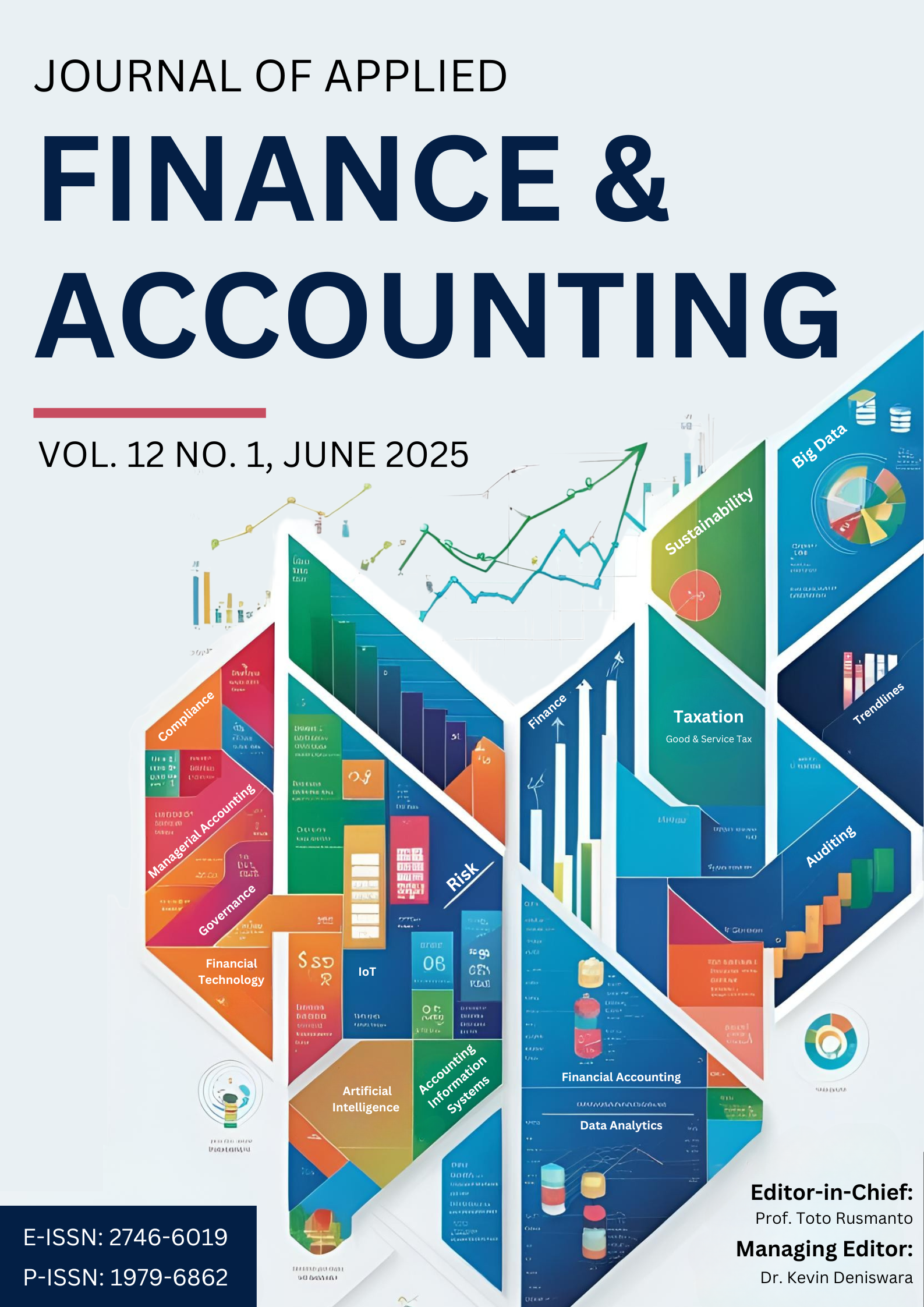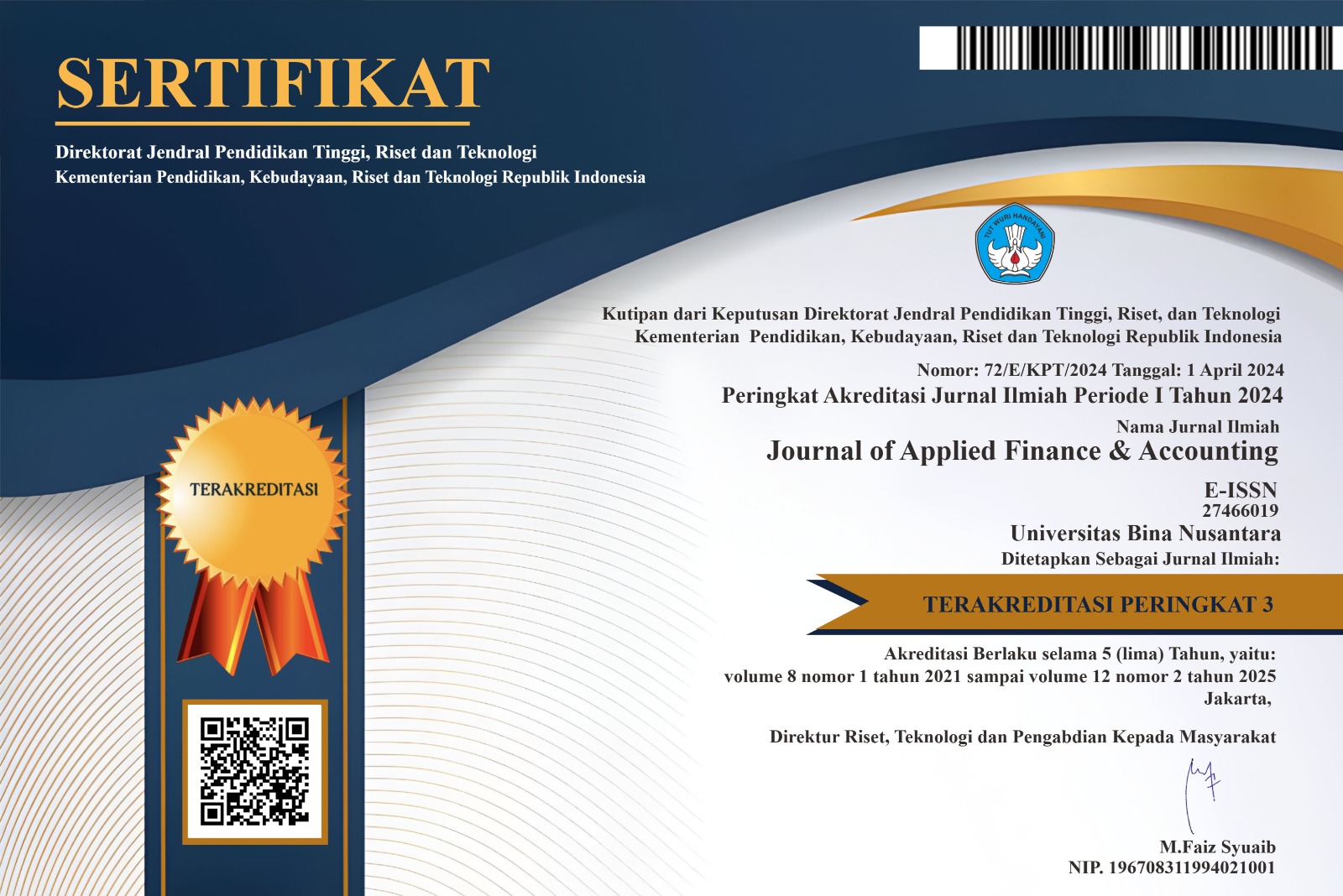DEVELOPMENT OF SUSTAINABILITY BALANCED SCORECARD: IMPACT ON COMPANY PERFORMANCE AND IMPLEMENTATION
DOI:
https://doi.org/10.21512/jafa.v12i1.13337Keywords:
Balanced Scorecard, Sustainability, Corporate Performance, ESG ReportingAbstract
This study explores integrating sustainability principles into the Balanced Scorecard (BSC) by incorporating Environmental, Social, and Governance (ESG) indicators. The research identifies how ESG aspects can be systematically embedded within the BSC framework to enhance company performance, promote transparency, and strengthen corporate social responsibility. This study narrows its scope to companies within the manufacturing industry to ensure coherence, given its significant contribution to the national economy and environmental impact. The sample consists of manufacturing companies listed on the Indonesia Stock Exchange (IDX), allowing for a more targeted application of the SBSC framework and relevant SULA indicators. These findings are expected to contribute to the practical and theoretical understanding of sustainability reporting and holistic performance measurement. Recognizing the fragmented and qualitative nature of prior sustainability performance assessments, this study introduces a holistic and data-driven framework using sustainability-linked accountability (SULA) indicators. The proposed model allows for standardized, cross-sector evaluation of ESG performance, particularly in the context of the Indonesian manufacturing industry. Based on literature analysis and empirical data, the study develops and applies a conceptual framework that integrates ESG metrics into BSC perspectives. The findings contribute to both theoretical advancement and practical implementation of comprehensive sustainability performance measurement systems.
References
Adams, C. A. (2004). The ethical, social and environmental reporting‐performance portrayal gap. Accounting, Auditing & Accountability Journal, 17(5), 731–757. https://doi.org/10.1108/09513570410567791
Adams, C. A., & Frost, G. R. (2008). Integrating sustainability reporting into management practices. Accounting Forum, 32(4), 288–302. https://doi.org/10.1016/j.accfor.2008.05.002
Al-ma’ani, B., Al-Qudah, S., & Shrouf, H. (2019). The Impact of Corporate Social Responsibility on Organizational Performance in Telecommunication Sector in Jordan. Modern Applied Science, 13(4), 1. https://doi.org/10.5539/mas.v13n4p1
Al-Shaer, H., & Zaman, M. (2019). CEO Compensation and Sustainability Reporting Assurance: Evidence from the UK. Journal of Business Ethics, 158(1), 233–252. https://doi.org/10.1007/s10551-017-3735-8
Al‐Shaer, H., & Zaman, M. (2018). Credibility of sustainability reports: The contribution of audit committees. Business Strategy and the Environment, 27(7), 973–986. https://doi.org/10.1002/bse.2046
Alkolid, Y., Kurniawan, V. R. B., Ma’arif, S., Zaibidi, N. Z., & Othman, N. A. (2023). Green-based supplier selection using BWM and VIKOR methods in the Indonesian manufacturing sector. Journal of Engineering and Applied Technology, 4(2), 78–86. https://doi.org/10.21831/jeatech.v4i2.62852
Alshehhi, A., Nobanee, H., & Khare, N. (2018). The Impact of Sustainability Practices on Corporate Financial Performance: Literature Trends and Future Research Potential. Sustainability, 10(2), 494. https://doi.org/10.3390/su10020494
Baboukardos, D. (2018). The valuation relevance of environmental performance revisited: The moderating role of environmental provisions. The British Accounting Review, 50(1), 32–47. https://doi.org/10.1016/j.bar.2017.09.002
Barnabè, F., & Busco, C. (2012). The causal relationships between performance drivers and outcomes. Journal of Accounting & Organizational Change, 8(4), 528–538. https://doi.org/10.1108/18325911211273518
Bianchi, F., Kung, H., & Tirskikh, M. (2023). The origins and effects of macroeconomic uncertainty. Quantitative Economics, 14(3), 855–896. https://doi.org/10.3982/QE1979
Carter, C. R., & Rogers, D. S. (2008). A framework of sustainable supply chain management: moving toward new theory. International Journal of Physical Distribution & Logistics Management, 38(5), 360–387. https://doi.org/10.1108/09600030810882816
Cerqueira-Streit, J., Endo, G., Guarnieri, P., & Batista, L. (2021). Sustainable Supply Chain Management in the Route for a Circular Economy: An Integrative Literature Review. Logistics, 5(4), 81. https://doi.org/10.3390/logistics5040081
Chairani, & Veronica Siregar, S. (2021). Disclosure of enterprise risk management in ASEAN 5: Sustainable development for green economy. IOP Conference Series: Earth and Environmental Science, 716(1), 012101. https://doi.org/10.1088/1755-1315/716/1/012101
Chen, L., Feldmann, A., & Tang, O. (2015). The relationship between disclosures of corporate social performance and financial performance: Evidences from GRI reports in manufacturing industry. International Journal of Production Economics, 170, 445–456. https://doi.org/10.1016/j.ijpe.2015.04.004
Clarkson, P., Li, Y., Richardson, G., & Tsang, A. (2019). Causes and consequences of voluntary assurance of CSR reports. Accounting, Auditing & Accountability Journal, 32(8), 2451–2474. https://doi.org/10.1108/AAAJ-03-2018-3424
Clarkson, P. M., Fang, X., Li, Y., & Richardson, G. (2013). The relevance of environmental disclosures: Are such disclosures incrementally informative? Journal of Accounting and Public Policy, 32(5), 410–431. https://doi.org/10.1016/j.jaccpubpol.2013.06.008
Clementino, E., & Perkins, R. (2021). How Do Companies Respond to Environmental, Social and Governance (ESG) ratings? Evidence from Italy. Journal of Business Ethics, 171(2), 379–397. https://doi.org/10.1007/s10551-020-04441-4
Cohen, S., Kadach, I., Ormazabal, G., & Reichelsten, S. (2023). Executive Compensation Tied to ESG Performance: International Evidence. Journal of Accounting Research, 61(3), 805–853. https://doi.org/10.1111/1475-679X.12481
Creswell, J. (2014). Research Design: Qualitative, Quantitative and Mixed Methods Approaches (4th ed.). Sage Publications.
Crossley, R. M., Elmagrhi, M. H., & Ntim, C. G. (2021). Sustainability and legitimacy theory: The case of sustainable social and environmental practices of small and medium‐sized enterprises. Business Strategy and the Environment, 30(8), 3740–3762. https://doi.org/10.1002/bse.2837
Dahlmann, F., Branicki, L., & Brammer, S. (2019). Managing Carbon Aspirations: The Influence of Corporate Climate Change Targets on Environmental Performance. Journal of Business Ethics, 158(1), 1–24. https://doi.org/10.1007/s10551-017-3731-z
Damtoft, N. F., van Liempd, D., & Lueg, R. (2024). Sustainability performance measurement – a framework for context-specific applications. Journal of Global Responsibility. https://doi.org/10.1108/JGR-05-2023-0082
de Andrade Guerra, J. B. S. O., Garcia, J., de Andrade Lima, M., Barbosa, S. B., Heerdt, M. L., & Berchin, I. I. (2018). A proposal of a Balanced Scorecard for an environmental education program at universities. Journal of Cleaner Production, 172, 1674–1690. https://doi.org/10.1016/j.jclepro.2016.11.179
de Villiers, C., La Torre, M., & Molinari, M. (2022). The Global Reporting Initiative’s (GRI) past, present and future: critical reflections and a research agenda on sustainability reporting (standard-setting). Pacific Accounting Review, 34(5), 728–747. https://doi.org/10.1108/PAR-02-2022-0034
de Villiers, C., Rouse, P., & Kerr, J. (2016). A new conceptual model of influences driving sustainability based on case evidence of the integration of corporate sustainability management control and reporting. Journal of Cleaner Production, 136, 78–85. https://doi.org/10.1016/j.jclepro.2016.01.107
Dias‐Sardinha, I., Reijnders, L., & Antunes, P. (2002). From environmental performance evaluation to eco‐efficiency and sustainability balanced scorecards. Environmental Quality Management, 12(2), 51–64. https://doi.org/10.1002/tqem.10063
Egorova, A., & Chigireva, D. (2022). The influence of corporate governance factors on ESG rating of industrial and IT companies. Russian Management Journal, 19(4), 451–474. https://doi.org/10.21638/spbu18.2021.404
Eliwa, Y., Aboud, A., & Saleh, A. (2021). ESG practices and the cost of debt: Evidence from EU countries. Critical Perspectives on Accounting, 79, 102097. https://doi.org/10.1016/j.cpa.2019.102097
Epstein, M. J., & Wisner, P. S. (2001). Using a Balanced Scorecard to Implement Sustainability. Environmental Quality Management, 11(2), 1–10. https://doi.org/10.1002/tqem.1300
Fallah Shayan, N., Mohabbati-Kalejahi, N., Alavi, S., & Zahed, M. A. (2022). Sustainable Development Goals (SDGs) as a Framework for Corporate Social Responsibility (CSR). Sustainability, 14(3), 1222. https://doi.org/10.3390/su14031222
Figge, F., Hahn, T., Schaltegger, S., & Wagner, M. (2002). The Sustainability Balanced Scorecard – linking sustainability management to business strategy. Business Strategy and the Environment, 11(5), 269–284. https://doi.org/10.1002/bse.339
Fijałkowska, J., & Oliveira, C. (2018). Balanced Scorecard in Universities. Journal of Intercultural Management, 10(4), 57–83. https://doi.org/10.2478/joim-2018-0025
Free, C., & Qu, S. Q. (2011). The use of graphics in promoting management ideas. Journal of Accounting & Organizational Change, 7(2), 158–189. https://doi.org/10.1108/18325911111139680
Friede, G., Busch, T., & Bassen, A. (2015). ESG and financial performance: aggregated evidence from more than 2000 empirical studies. Journal of Sustainable Finance & Investment, 5(4), 210–233. https://doi.org/10.1080/20430795.2015.1118917
Gasperini, A. (2019). Principles for Responsible Investment (PRI) and ESG Factors (pp. 1–12). https://doi.org/10.1007/978-3-319-71063-1_19-1
Gillan, S. L., Koch, A., & Starks, L. T. (2021). Firms and social responsibility: A review of ESG and CSR research in corporate finance. Journal of Corporate Finance, 66, 101889. https://doi.org/10.1016/j.jcorpfin.2021.101889
Gray, S. J., Hellman, N., & Ivanova, M. N. (2019). Extractive Industries Reporting: A Review of Accounting Challenges and the Research Literature. Abacus, 55(1), 42–91. https://doi.org/10.1111/abac.12147
Grewatsch, S., & Kleindienst, I. (2017). When Does It Pay to be Good? Moderators and Mediators in the Corporate Sustainability–Corporate Financial Performance Relationship: A Critical Review. Journal of Business Ethics, 145(2), 383–416. https://doi.org/10.1007/s10551-015-2852-5
Habib, A., Khan, M. A., & Tangl, A. (2024). Integration of green finance with ESG compliance to enhance the firm value. Managerial approach to determining the level of liquidity. International Journal of Innovative Research and Scientific Studies, 7(3), 1289–1300. https://doi.org/10.53894/ijirss.v7i3.3290
Han, J.-J., Kim, H. J., & Yu, J. (2016). Empirical study on relationship between corporate social responsibility and financial performance in Korea. Asian Journal of Sustainability and Social Responsibility, 1(1), 61–76. https://doi.org/10.1186/s41180-016-0002-3
Hansen, E. G., & Schaltegger, S. (2016). The Sustainability Balanced Scorecard: A Systematic Review of Architectures. Journal of Business Ethics, 133(2), 193–221. https://doi.org/10.1007/s10551-014-2340-3
Hermundsdottir, F., & Aspelund, A. (2022). Competitive sustainable manufacturing - Sustainability strategies, environmental and social innovations, and their effects on firm performance. Journal of Cleaner Production, 370, 133474. https://doi.org/10.1016/j.jclepro.2022.133474
Hoque, Z. (2014). 20 years of studies on the balanced scorecard: Trends, accomplishments, gaps and opportunities for future research. The British Accounting Review, 46(1), 33–59. https://doi.org/10.1016/j.bar.2013.10.003
Hristov, I., Chirico, A., & Appolloni, A. (2019). Sustainability Value Creation, Survival, and Growth of the Company: A Critical Perspective in the Sustainability Balanced Scorecard (SBSC). Sustainability, 11(7), 2119. https://doi.org/10.3390/su11072119
Hubbard, G. (2009). Measuring organizational performance: beyond the triple bottom line. Business Strategy and the Environment, 18(3), 177–191. https://doi.org/10.1002/bse.564
IFRS. (2021). IFRS Foundation publishes 2021 Annual Report. https://www.ifrs.org/news-and-events/news/2022/04/ifrs-foundation-publishes-2021-annual-report/
Kaplan, R. S., & David P. Norton. (2001). Transforming the Balanced Scorecard from Performance Measurement to Strategic Management: Part . Accounting Horizons, 15(1), 87–104.
Kaplan, R. S., & Norton, D. P. (1996). The Balanced Scorecard: Translating Strategy Into Action. Harvard Business Press.
Khalid, S., Beattie, C., Sands, J., & Hampson, V. (2019). Incorporating the environmental dimension into the balanced scorecard. Meditari Accountancy Research, 27(4), 652–674. https://doi.org/10.1108/MEDAR-06-2018-0360
Kulal, A., Abhishek N, Dinesh, S., & M.S., D. (2023). Impact of Environmental, Social, and Governance (ESG) Factors on Stock Prices and Investment Performance. Macro Management & Public Policies, 5(2), 14–26. https://doi.org/10.30564/mmpp.v5i2.5659
Lim, W. M., Ciasullo, M. V., Douglas, A., & Kumar, S. (2022). Environmental social governance (ESG) and total quality management (TQM): a multi-study meta-systematic review. Total Quality Management & Business Excellence, 1–23. https://doi.org/10.1080/14783363.2022.2048952
Lin, Y., Luo, J., Ieromonachou, P., Rong, K., & Huang, L. (2019). Strategic orientation of servitization in manufacturing firms and its impacts on firm performance. Industrial Management & Data Systems, 119(2), 292–316. https://doi.org/10.1108/IMDS-10-2017-0485
Lu, M.-T., Hsu, C.-C., Liou, J. J. H., & Lo, H.-W. (2018). A hybrid MCDM and sustainability-balanced scorecard model to establish sustainable performance evaluation for international airports. Journal of Air Transport Management, 71, 9–19. https://doi.org/10.1016/j.jairtraman.2018.05.008
Maghfira, M. P., Un, A. W., Yasin, M., & Corrado, C. (2023). Basic Industry Strategy and Orientation Strategy. Journal Markcount Finance, 1(2), 112–117. https://doi.org/10.55849/jmf.v1i2.120
Maiga, A. S., & Jacobs, F. A. (2007). The Moderating Effect of Manager’s Ethical Judgment on the Relationship between Budget Participation and Budget Slack. Advances in Accounting, 23, 113–145. https://doi.org/10.1016/S0882-6110(07)23005-6
Martiny, A., Taglialatela, J., Testa, F., & Iraldo, F. (2024). Determinants of environmental social and governance (ESG) performance: A systematic literature review. Journal of Cleaner Production, 456, 142213. https://doi.org/10.1016/j.jclepro.2024.142213
Meadowcroft, J. (2009). What about the Politics? Sustainable Development, Transition Management, and Long Term Energy Transitions. Policy Sciences, 42(4), 323–340.
Michelon, G., Pilonato, S., & Ricceri, F. (2015). CSR reporting practices and the quality of disclosure: An empirical analysis. Critical Perspectives on Accounting, 33, 59–78. https://doi.org/10.1016/j.cpa.2014.10.003
Miralles-Quirós, M., Miralles-Quirós, J., & Valente Gonçalves, L. (2018). The Value Relevance of Environmental, Social, and Governance Performance: The Brazilian Case. Sustainability, 10(3), 574. https://doi.org/10.3390/su10030574
Modell, S. (2012). Strategy, political regulation and management control in the public sector: Institutional and critical perspectives. Management Accounting Research, 23(4), 278–295. https://doi.org/10.1016/j.mar.2012.05.001
Morhardt, J. E. (2010). Corporate social responsibility and sustainability reporting on the Internet. Business Strategy and the Environment, 19(7), 436–452. https://doi.org/10.1002/bse.657
Muff, K., Kapalka, A., & Dyllick, T. (2017). The Gap Frame - Translating the SDGs into relevant national grand challenges for strategic business opportunities. The International Journal of Management Education, 15(2), 363–383. https://doi.org/10.1016/j.ijme.2017.03.004
Musyarofah, S. A., Tontowi, A. E., Masruroh, N. A., & Wibowo, B. S. (2023). Developing supply chain readiness measurement tool for the manufacturing industrial estates. Journal of Open Innovation: Technology, Market, and Complexity, 9(1), 100019. https://doi.org/10.1016/j.joitmc.2023.100019
Muthiah, M., & Anggoro, Y. (2024). Implementation of ESG as a Strategy for Business Sustainability in a Public-Listed Tobacco Company in Indonesia. International Journal of Current Science Research and Review, 07(06). https://doi.org/10.47191/ijcsrr/V7-i6-88
Nikolaou, I. E., & Tsalis, T. A. (2013). Development of a sustainable balanced scorecard framework. Ecological Indicators, 34, 76–86. https://doi.org/10.1016/j.ecolind.2013.04.005
Nirino, N., Battisti, E., Ferraris, A., Dell’Atti, S., & Briamonte, M. F. (2022). How and when corporate social performance reduces firm risk? The moderating role of corporate governance. Corporate Social Responsibility and Environmental Management, 29(6), 1995–2005. https://doi.org/10.1002/csr.2296
Nollet, J., Filis, G., & Mitrokostas, E. (2016). Corporate social responsibility and financial performance: A non-linear and disaggregated approach. Economic Modelling, 52, 400–407. https://doi.org/10.1016/j.econmod.2015.09.019
Nugrahanti, T. P., & Lysandra, S. (2024). Environmental Audit and CSR Practices on the Financial Performance of Small and Medium Manufacturing Companies in Indonesia. Ilomata International Journal of Tax and Accounting, 5(2). https://doi.org/10.61194/ijtc.v5i2.1024
OECD. (2020). Integrating ESG factors in the investment decision-making process of institutional investors. In in OECD Business and Finance Outlook 2020: Sustainable and Resilient Finance. OECD Publishing. https://doi.org/10.1787/b854a453-en
Omowonuola Ireoluwapo Kehinde Olanrewaju, Gideon Oluseyi Daramola, & Olusile Akinyele Babayeju. (2024). Transforming business models with ESG integration: A strategic framework for financial professionals. World Journal of Advanced Research and Reviews, 22(3), 554–563. https://doi.org/10.30574/wjarr.2024.22.3.1757
Permana, T. W., Yudoko, G., & Prasetio, E. A. (2024). Forecasting the potential output and growth of the manufacturing industry: a case study of Indonesia’s manufacturing sector. Jurnal Ekonomi & Studi Pembangunan, 24(2), 368–389. https://doi.org/10.18196/jesp.v24i2.18716
Rafiq, M., & Zhang, X. (2019). Impact of Balanced scorecard as, strategic Management System tool, to improve sustainable development: measuring a mediation of organizational performance through PLS-Smart (Preprint). https://doi.org/10.2196/preprints.16360
Rojas-Lema, X., Alfaro-Saiz, J.-J., Rodríguez-Rodríguez, R., & Verdecho, M.-J. (2021). Performance measurement in SMEs: systematic literature review and research directions. Total Quality Management & Business Excellence, 32(15–16), 1803–1828. https://doi.org/10.1080/14783363.2020.1774357
Ronda-Pupo, G. (2015). Growth and consolidation of strategic management research: Insights for the future development of strategic management. Academy of Strategic Management Journal , 14(155).
Schaltegger, S., Freund, F. L., & Hansen, E. G. (2012). Business cases for sustainability: the role of business model innovation for corporate sustainability. International Journal of Innovation and Sustainable Development, 6(2), 95. https://doi.org/10.1504/IJISD.2012.046944
Schaltegger, S., & Wagner, M. (2006). Integrative management of sustainability performance, measurement and reporting. International Journal of Accounting, Auditing and Performance Evaluation, 3(1), 1. https://doi.org/10.1504/IJAAPE.2006.010098
Searcy, C. (2012). Corporate Sustainability Performance Measurement Systems: A Review and Research Agenda. Journal of Business Ethics, 107(3), 239–253. https://doi.org/10.1007/s10551-011-1038-z
Setyaningsih, S., Widjojo, R., & Kelle, P. (2024). Challenges and opportunities in sustainability reporting: a focus on small and medium enterprises (SMEs). Cogent Business & Management, 11(1). https://doi.org/10.1080/23311975.2023.2298215
Skouloudis, A., Evangelinos, K., & Kourmousis, F. (2009). Development of an Evaluation Methodology for Triple Bottom Line Reports Using International Standards on Reporting. Environmental Management, 44(2), 298–311. https://doi.org/10.1007/s00267-009-9305-9
Stead, J. G., & Stead, W. E. (2013). The Coevolution of Sustainable Strategic Management in the Global Marketplace. Organization & Environment, 26(2), 162–183. https://doi.org/10.1177/1086026613489138
Surana, K., Doblinger, C., Anadon, L. D., & Hultman, N. (2020). Effects of technology complexity on the emergence and evolution of wind industry manufacturing locations along global value chains. Nature Energy, 5(10), 811–821. https://doi.org/10.1038/s41560-020-00685-6
Taghikhah, F., Voinov, A., & Shukla, N. (2019). Extending the supply chain to address sustainability. Journal of Cleaner Production, 229, 652–666. https://doi.org/10.1016/j.jclepro.2019.05.051
Talbot, D., & Boiral, O. (2015). Strategies for Climate Change and Impression Management: A Case Study Among Canada’s Large Industrial Emitters. Journal of Business Ethics, 132(2), 329–346. https://doi.org/10.1007/s10551-014-2322-5
Tariq, M. (2014). INVESTIGATING THE IMPACT OF BALANCED SCORECARD ON PERFORMANCE OF BUSINESS: A STUDY BASED ON THE BANKING SECTOR OF PAKISTAN. IBT Journal of Business Studies, 10(1). https://doi.org/10.46745/ilma.jbs.2014.10.01.09
Taticchi, P., Tonelli, F., & Pasqualino, R. (2013). Performance measurement of sustainable supply chains. International Journal of Productivity and Performance Management, 62(8), 782–804. https://doi.org/10.1108/IJPPM-03-2013-0037
Thomas. Water J, & Grimes, R. (2020). Environmental, social and governance. In The UK and EMEA Corporate Counsel Handbook. Bloomsbury Professional. https://doi.org/10.5040/9781526509536.chapter-012
Velte, P. (2017). Does ESG performance have an impact on financial performance? Evidence from Germany. Journal of Global Responsibility, 8(2), 169–178. https://doi.org/10.1108/JGR-11-2016-0029
Verrax, F. (2019). Elinor Ostrom or the Revolution of the Commons. In Economic Theory and Globalization (pp. 195–219). Springer International Publishing. https://doi.org/10.1007/978-3-030-23824-7_9
Weber, O. (2014). Environmental, Social and Governance Reporting in China. Business Strategy and the Environment, 23(5), 303–317. https://doi.org/10.1002/bse.1785
Xie, Q., Islam, M. ul, Su, Y.-Y., Khan, A., Hishan, S. S., & Lone, S. A. (2022). The investigation of sustainable environmental performance of manufacturing companies: mediating role of organizational support and moderating role of CSR. Economic Research-Ekonomska Istraživanja, 35(1), 4128–4148. https://doi.org/10.1080/1331677X.2021.2011369
Yoon, B., Lee, J. H., & Byun, R. (2018). Does ESG Performance Enhance Firm Value? Evidence from Korea. Sustainability, 10(10), 3635. https://doi.org/10.3390/su10103635
Zainuddin, Z., Wahab, N. A., Shari, W., Bahaman, M. A., & Yusof, R. M. (2024). The Impact of Environmental, Social and Governance (ESG) Practices on the Financial Performance of Green Companies in Malaysia: An Empirical Analysis. The Indonesian Capital Market Review, 16(1), 55–66. https://doi.org/10.21002/icmr.v16i1.1177
Zalva, R., -, A., Salsabilla, S., Saputra, A. D., Yanuardi, R., & Maharani, A. (2023). THE ROLE OF THE MANUFACTURING ON THE INDONESIAN ECONOMY. Indonesian Journal of Multidisciplinary Sciences (IJoMS), 2(1), 157–166. https://doi.org/10.59066/ijoms.v2i1.322
Zhao, Z.-Y., & Chen, Y.-L. (2018). Critical factors affecting the development of renewable energy power generation: Evidence from China. Journal of Cleaner Production, 184, 466–480. https://doi.org/10.1016/j.jclepro.2018.02.254
Zuhair, M. H., & Kurian, P. A. (2016). Socio-economic and political barriers to public participation in EIA: implications for sustainable development in the Maldives. Impact Assessment and Project Appraisal, 34(2), 129–142. https://doi.org/10.1080/14615517.2016.1176404
Zumente, I., & Bistrova, J. (2021). ESG Importance for Long-Term Shareholder Value Creation: Literature vs. Practice. Journal of Open Innovation: Technology, Market, and Complexity, 7(2), 127. https://doi.org/10.3390/joitmc7020127
Downloads
Published
Issue
Section
License
Authors who publish with this journal agree to the following terms:
Authors retain copyright and grant the journal right of first publication with the work simultaneously licensed under a Creative Commons Attribution License that allows others to share the work with an acknowledgement of the work's authorship and initial publication in this journal.
Authors are able to enter into separate, additional contractual arrangements for the non-exclusive distribution of the journal's published version of the work (e.g., post it to an institutional repository or publish it in a book), with an acknowledgement of its initial publication in this journal.
Authors are permitted and encouraged to post their work online (e.g., in institutional repositories or on their website) prior to and during the submission process, as it can lead to productive exchanges, as well as earlier and greater citation of published work (See The Effect of Open Access).





